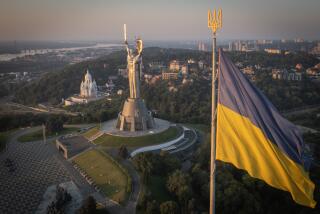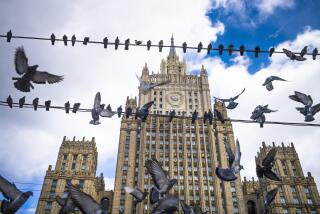Russia holds firm against military intervention in Syria
Reporting from Beirut — As diplomats attempted to craft a compromise, Russia remained firm Wednesday in its pledge to veto any U.N. Security Council resolution that could open the door for international military intervention in Syria.
Meanwhile, fighting raged anew in the troubled Middle East nation, with nearly 70 additional deaths reported by opponents of Syrian President Bashar Assad, whose bloody crackdown on street protests has led to calls from the Arab League and Western powers for him to step aside.
After a closed-door meeting, U.N. diplomats said progress had been made to overcome Russia’s objections. “But there are a lot of difficult issues and we are not there yet,” said British Ambassador Mark Lyall Grant, according to the Associated Press.
Russian Ambassador Vitaly Churkin said, “I think we have a much better understanding of what we need to do to reach consensus.”
But Moscow continues to oppose any U.N. move that calls for Assad to step down or would slap new economic penalties or an arms embargo on Damascus.
Behind Russia’s resolute stance is its longtime relationship with Assad and his family, who have run Syria for four decades, as well as a web of business and security interests, and deep discomfort in Moscow with the concept of foreign-mandated change in leadership. Russian diplomats say they were deceived last year when a U.N. resolution designed to protect Libyan civilians morphed into a Western-led bombing campaign that doomed the long-ruling government of Moammar Kadafi.
Moreover, opposition to the resolution will not cause significant damage to relations between Russia, the West and the Arab countries of the Persian Gulf, predicted Fyodor Lukyanov, editor of the journal Russia in Global Affairs. Other concerns, such as the situation in Iran and Afghanistan, keep Washington and its allies engaged with Russia, he said, and Moscow’s relations with gulf countries are already bad.
“Russia has nothing to lose,” Lukyanov said.
U.N. action could help determine the future of Syria as it nears the one-year anniversary of a protest movement that was met by the government crackdown and has since evolved into armed rebellion that has left the country on the precipice of civil war.
A draft U.N. resolution circulating in New York would authorize unspecified “further measures” should Syria not comply with its terms, including a “political transition” in which Assad would cede power.
The Arab League and its Western allies, including Washington, are pushing the proposal. But Syria, backed by Russia and other nations, calls the scheme an affront to its sovereignty.
Moscow, which last year joined with China to veto a U.N. resolution that would have condemned the Syrian crackdown on dissent, is concerned that the revolt in Syria, along with other “Arab Spring” movements, are part of a Western conspiracy to dominate the Middle East, Russian analysts say.
Vladimir Chizhov, Russia’s envoy to the European Union, said the current U.N. draft was “missing the most important thing: a clear clause ruling out the possibility that ... [it] could be used to justify military intervention in Syrian affairs.”
“For this reason,” he said, “I see no chance this draft could be adopted.”
Violence continued to ravage Syria on Wednesday, with an opposition coalition, the Local Coordination Committees, reporting at least 68 more deaths, more than half in clashes outside Damascus. The military has been clearing armed rebels from towns near the capital after insurgents brazenly advanced to within a few miles of the capital, embarrassing the government.
The official government news agency reported that four military officers, including a brigadier general, were killed Wednesday and six were wounded in a confrontation with an “armed terrorist group” outside Damascus.
The United Nations has reported more than 5,000 deaths since protests against Assad’s rule broke out in March.
Casualty figures cannot be independently verified because journalists’ access is limited in Syria.
Also on Wednesday, Iran reported that 11 Iranian pilgrims had been abducted in Syria, the latest in a series of kidnappings of Iranian citizens. Iran is a close ally of Syria, but Tehran has advised its citizens to hold off on bus tours to the nation.
Kidnappings, mostly of Syrians, have become a regular feature of the conflict, reflecting a generalized breakdown in law and order, human rights activists say. Abductees are often used as bargaining chips to gain the release of kidnap victims held by the other side, observers say.
Special correspondents Alexandra Sandels in Beirut and Khristina Narizhnaya in Moscow contributed to this report.
More to Read
Sign up for Essential California
The most important California stories and recommendations in your inbox every morning.
You may occasionally receive promotional content from the Los Angeles Times.










